SPOILERS BELOW! Don’t read if you don’t want to know.
What’s the Horror: A deadly pandemic (yeah, I know, but I promise this one is worth watching)
Does the Dog Die? No animal cruelty in this one
Gore Factor: Maybe a 2? There’s really no gore to speak of here. Trust me, it doesn’t need it.
Character Quality: Excellent. Gabby Beans (as Monique) is captivating.
Re-Watch Scale: Not too often. Not because it isn’t amazing, which it is, but it’s a hard watch given that most of us, self included, really want to just forget all about the early days of lockdown, when no one knew what the hell we were dealing with and how long it was going to last.
SPOILERS AHEAD – LAST WARNING

The Harbinger came out in 2022, as did another film called simply Harbinger. I’m not sure if that’s why this one didn’t get as much attention as it deserves, but trust me, it deserves your attention. It deserves ALL the attention. Better than any pandemic-based movie I’ve seen over the past few years, The Harbinger serves as a sad, scary metaphor for death and how fear of it can completely dominate people’s lives. It also evokes the panic and trepidation of those early weeks and months of COVID-19, when everything, and everyone, felt dangerous, and learning how to navigate our lives in a different way felt daunting and depressing.

The Harbinger presents us with a world in still, silent turmoil: Monique has moved back into her father’s house with her brother to stay with them during the pandemic. She’s uprooted herself in order to ride out the crisis with her loved ones, hiding out at home and marveling over how they can now order groceries in advance and pick them up without making any contact with anyone (remember how novel that was in the beginning?). It’s the dead of winter, and while Monique and her family sit down for a warm family dinner, the view outside is cold, grey, and completely still – there’s nothing going on out there, no movement, no action, no life.
But there’s a twist here that, even though it’s not a detail the real pandemic contained, feels as real as COVID itself: in this version of the pandemic, when you die, everyone you ever knew immediately forgets that you ever existed. Let that sink in for a moment. The second you’re snuffed out, all of your loved ones forget who you are. And every time someone you love checks out, you forget who they were. Imagine it: All over the globe, people are looking at photos on their phones wondering who the hell that person is. And it’s you. Terrifying. Aren’t we all afraid of being forgotten after we’re gone? Isn’t so much of what we do in life an attempt to leave a legacy behind? Imagine being a parent and realizing that your children will forget you the instant you stop breathing. Now imagine being locked up in your apartment, looking at photos of strange people and wondering why the hell you’re surrounded by images of strangers. It’s horrifying, existential stuff. It harkens back to that first year of COVID-19, when the number of dead became so overwhelming we grew numb to it, unable to comprehend how so many human beings could perish in one day. And we weren’t even able to honor them with a funeral service. They just … died. And if they had to be hospitalized, that was another kind of disappearance, because you couldn’t visit them. You didn’t get to say goodbye. So many people died afraid and alone. And The Harbinger harkens back to those fears with astounding accuracy.

But I’m getting ahead of myself. It will take a while before anyone learns the truth about what The Harbinger does to any life it snuffs out. First, there’s a different dilemma Monique faces that will be familiar to all of us: she has a friend who lives in the city (I think it’s New York) and she is distressed. She’s in a very bad place, and she’s all alone. She’s a friend Monique hasn’t kept in touch with since college, but when they were close, Mavis helped Monique through a particularly dark time. According to Monique, Mavis saved her life, and Monique promised her that no matter what, she would do the same for Mavis if she was ever in need. And she’s desperately in need now. How many of us faced a situation like this throughout the pandemic? Going to visit a sick friend was an absolute minefield, and if a friend or family member needed anything at all, you had to evaluate whether or not helping them out was worth the risk. Monique decides it’s worth the risk, and against the advice of her family, she goes to help her friend.
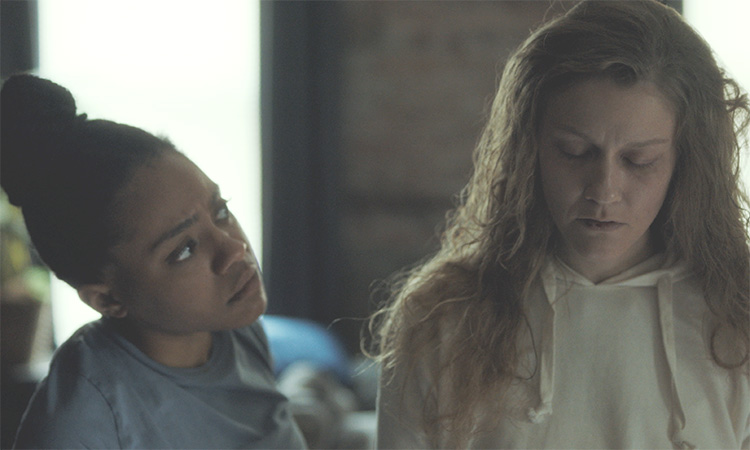
A big part of Mavis’s distress is that she’s not just sick. She’s having visitations in her dreams. Nightmares from which she cannot wake. A horrible entity wearing an awful plague mask stalks her in her sleep. And it’s getting harder to resist it. Would it help just to know you’re not alone? Monique asks Mavis at one point, and damn, that hits hard. It should be such an easy thing to do, but during the height of COVID-19, it felt like an impossible task to accomplish for anyone. But Monique is a fucking hero. She made a promise, and once she arrives at Mavis’s apartment, she comes through for her friend, hugging her and even offering to sleep next to her so she won’t be so scared.
:no_upscale()/cdn.vox-cdn.com/uploads/chorus_asset/file/24248793/Loom.jpg)
Unfortunately, human kindness in this situation means you risk being struck down by the same thing that’s tormenting the person you’re trying to help, and that’s what happens to Monique. She starts having bizarre dreams from the first night. So let’s talk about these dreams: Mavis describes how they’ve slowly increased in duration, to the point that now she sleeps for days at a time, unable to wake no matter what she does. The only reason she even knows she’s sleeping is because – she can’t go to sleep when she’s in them. She’s already asleep. And the plague doctor is always there, telling her it’s almost time for her to die, to fall asleep, and never wake up. Monique responds with empathy and support – exactly what anyone would do for a friend in this situation, except in this situation, showing up with empathy and support means you might be the next to die. It’s clear Monique doesn’t understand this, and whether or not she’d come to the aid of her friend if she knew is unclear. She probably would. It’s the sort of balance a lot of us had to deal with during the pandemic, and it forced us to make choices we never thought we’d have to make, to behave in ways we never thought we would behave. Suddenly, just extending a helping hand has disastrous consequences, and what that does to our collective psyche is incomprehensible.
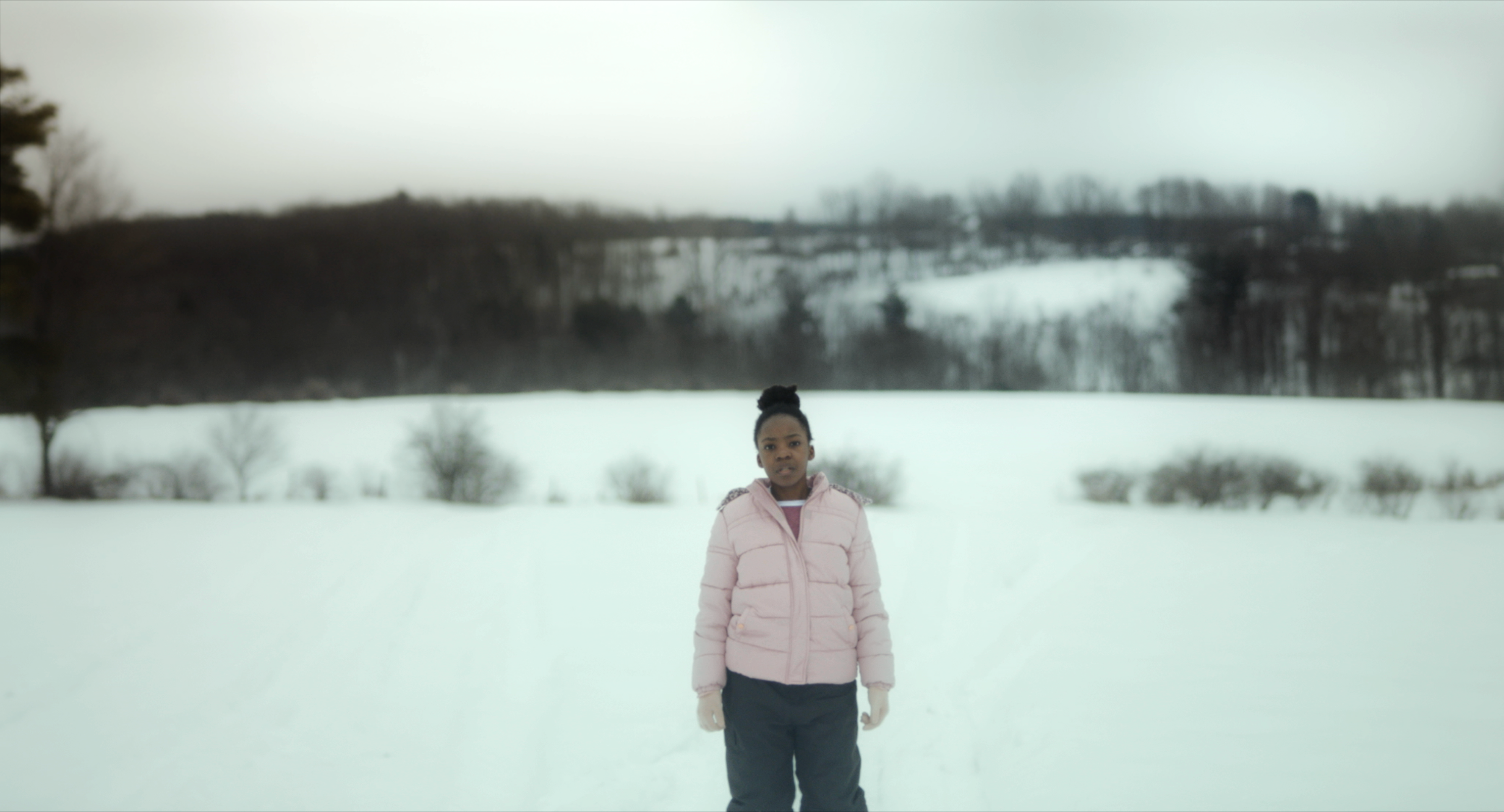
Monique’s first dream reveals her as a child, walking through the snow with her mother. We can’t see Mom, but we hear her, calling Monique into the woods. She calls Monique “sparrow,” a detail that will matter later. Having already seen Monique with her family we know her mother has already died, and sure enough, instead of seeing her mother emerge from the woods, Monique sees a dark shrouded figure. Please don’t hurt me, she begs, and then we cut to Monique in the present moment, sitting upright on Mavis’s bed, still sleeping. She wakes up and checks her phone, only to find a long list of unreturned texts from her brother. Who knows how long she’s been asleep. Mavis is still snoozing, so there’s no way to know. Monique hears coughing from the apartment upstairs and goes out into the den to listen more closely. Her brother Facetimes her and immediately asks why she isn’t wearing her mask. And just like that, reality intrudes upon the safe little bubble Monique created with her friend. When it was just the two of them, it felt like the right thing to do to unmask and hug. But with her brother on the line asking questions, Monique struggles to justify herself. Again – such a familiar experience, right?
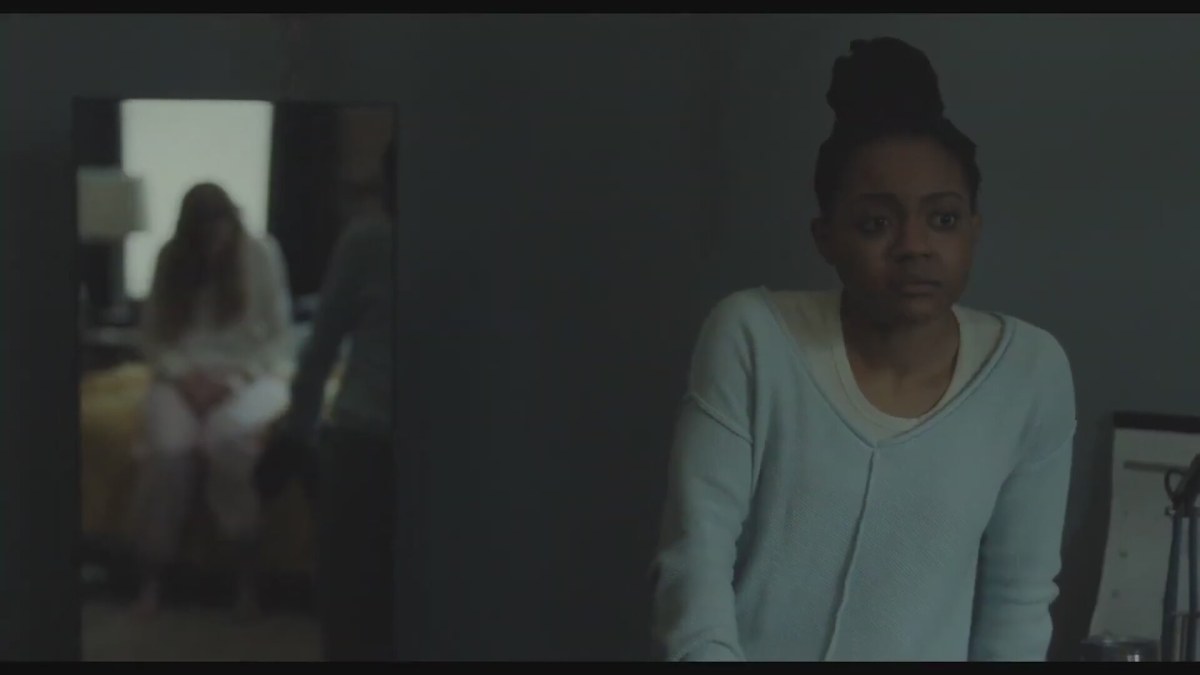
Her brother Lyle tells her their father started running a high fever the night before. They hope it’s not that, but they can’t be sure. Suddenly Mavis starts to scream, and just as suddenly, the ceiling caves in and the body of a little boy crashes through it, landing on the floor with a thud. He’s bleeding from his mouth. Panicked, Monique looks around for any sign of what the hell is going on, and through an open doorway, the image of the plague doctor appears. “He says it’s nice to meet you,” the ceiling kid says, and then Monique wakes up again – but is it for real this time? It’s already getting hard to tell. Damn, this plague moves fast, doesn’t it?
Lyle calls (again), but Dad is fine. And Mavis screams (again), but no one falls through the ceiling. Monique goes to Mavis, who has bitten her lip in an attempt to wake herself up. Monique asks Mavis to describe the entity to her, and she makes a sketch of it – looks like Monique is quite the artist given the quality of the sketch. Then they post the picture online everywhere they can, asking if others have seen the same thing. I’m surprised they don’t know anything about the plague doctor and his mask, but the internet has to tell them what it is. While they’re reading about it, they hear an ambulance siren stopping in front of the building. It’s the little boy. He was real, and he had the plague, and the ambulance is there to take him away. He’s dead.
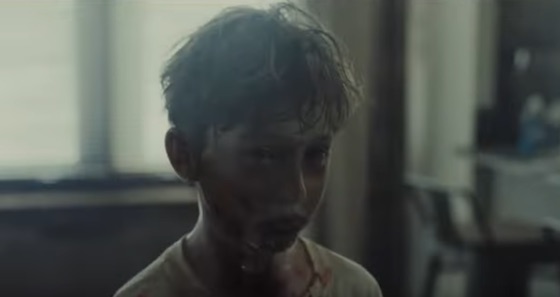
We cut to nighttime. It’s raining as we peer through a rainy window. A woman is lying in bed as a young girl approaches her, and we see that it’s young Monique again, and the woman in bed is her mom. She crawls into bed with her, frightened by the storm, and saddened that she’s forgetting what her grandmother looks like. She’s afraid people will forget her when she dies. Mom reassures her that the end of her life is a long way off, then points at a picture of her grandmother to reinforce to Moniqe that she will be remembered. But the plague doctor is there, hiding in the corner of the room, and when Monique sees it her Mom changes. Some sort of black, thick tongue sneaks out from between her lips, and she shoves Monique under the covers. As she fights, Monique (in adult form) suddenly finds herself in some sort of morgue-mobile; it’s cold and blue and there are dead bodies on either side of her.

She bangs on the walls of the truck, begging it to stop. It stops. She leaps out, and finds herself in a dark room. A flashlight is at her feet. She picks it up and starts to walk through a hallway, trying to find a way out. Instead, she finds the little boy who died in Mavis’s apartment building. I can help you wake up, he tells her before plunging a needle into her temple. Monique wakes up screaming.
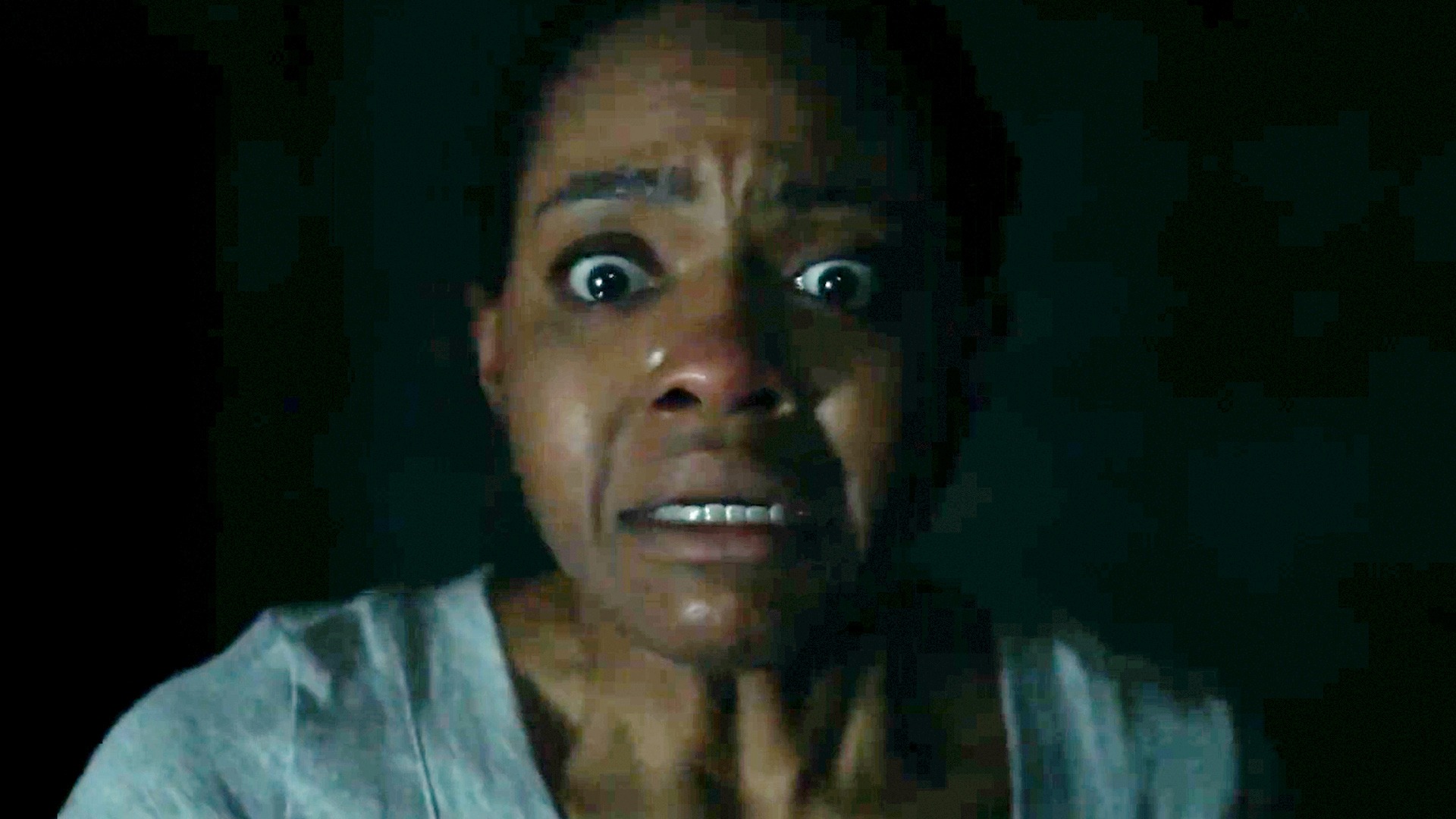
Unfortunately, Mavis is in worse shape than Monique. She’s standing stock-still in the middle of the bedroom, fast asleep. It’s unclear how long she’s been standing there. She’s urinated on herself. Monique cleans it up. It’s another reminder of how humiliating illness can be, how undignified our bodies can be as we die. Yet Monique is there to take care of her, even though she’s paying a heavy price. When Mavis screams herself awake, Monique admits that she’s seeing the plague doctor in her dreams now, too. Mavis is understandably distraught. She feels like she never should have called, that she’s doomed her friend just as surely as she is doomed herself. It’s a sucky way to feel, for sure, but there is nothing to be done now except deal with it. Monique isn’t ready to give up. She’s made an appointment with a demonologist for them to meet with on a Skype call.

The demonologist doesn’t have good news for the two. This entity they are seeing is NOT the plague, she says, but it feeds on the fear the plague creates. What it is, according to her, is a bad idea. It lodges in your head and won’t leave. This being has come to be known as The Harbinger because once you see it, it’s all over. It uses anything and everything it can to deepen your fear and confusion. And the more fear it generates within you, the deeper it digs – until at last it consumes you entirely. Everyone you’ve known, everything you’ve ever done, even everything you own disappears when it finally erases you. Because of this, it’s impossible to track. No living person even knows there’s something to track at all, because they’ve all forgotten the dead ever existed. The demonologist only knows about it because the process isn’t perfect; it often leaves relics behind like a photo or a piece of clothing, and through talking to so many people some relics of their stories have stayed in her memory. But she doesn’t remember anything about them. And that’s all the information she has – there’s no solution to the problem she can offer. She’s just hoping to stop the spread of the fear that invites the entity in.

Monique and Mavis are stunned. It’s not just the dying, Mavis tells Monique. It’s the cruelty of it, that no one will remember her when she’s gone. She shows Monique a picture of a man who is looking at her with love. Mavis has no idea who he is, but she can tell it is someone who loved her, but she has no recollection of their relationship. They both surmise that this is the person who infected Mavis. She probably loved that man too, Mavis concludes, but now he’s just gone as if he never existed. She cannot remember him. And she knows that when the plague doctor finally gets his hands on her, no one will remember her either. It’s brutal.
And it’s too much for Monique, who waits until Mavis falls asleep that night and then writes her a note before taking off. She drives back home to her father’s house, where her dad and her brother are both angry she’s come back after being exposed to the illness. Welcome home!

There’s a surreal conversation that takes place here; the camera cuts between close-ups of Monique and her brother as they discuss the consequences of her return. Close-up of the brother, talking through his mask: Monique has to isolate herself in her bedroom. Cut to close-up of Monique, also talking through her mask: yes, yes of course. Back to Lyle: and you have to wear your mask everywhere outside of your room. Cut to Monique: Absolutely. I promise. Cut back to Lyle: Did you do what you set out to do? Did you help your friend? Cut back to Monique, but this time – she’s not wearing her mask. Tears fill her eyes as she starts to tell them how she abandoned Mavis in her time of need, but Lyle cuts her off. Where is your mask? he demands of her, and Monique reaches instinctively for her face where her mask should be, but it’s gone.

Lyle’s body language shifts, as does that of their father. Lyle rushes Monique and grabs her roughly, dragging her up from the sofa and towards the stairs. “I’ll go! I’ll go!” Monique shouts, trying to get Lyle to stop manhandling her, but he persists, as Dad shouts at her to get upstairs. It’s another harsh reality of the pandemic that’s easy to understand: as soon as you’re infected, and at the point where you need the most love and support, you’re cut off entirely from everyone, left to handle the illness on your own. You know you’re a danger to others, but the instinct NOT to isolate is still there; as soon as Lyle shoves Monique into her room and slams the door, she turns around to see her dead mother sitting in her bed. Monique immediately starts pounding at the door, begging to be let out, but of course, no one comes to help her, because as far as they know this is just Monique trying to get out of isolation. Now the Harbinger appears before her, and she turns back to the door, pounding and shouting until she knocks a hinge loose and collapses onto the door as it smashes to the floor.
Monique stands up and looks around. She’s no longer at home; she’s in a funeral parlor. There’s an open casket at the end of the hall – it’s the boy from Mavis’s apartment building who died. Monique hears a sound – it sure sounds like Mavis screaming – and when she turns back around, the boy’s body is no longer in the casket. The lid slams shut, and the boy is standing behind it. He starts to walk towards her, and she takes off through a door at the back of the room. She ends up in a morgue, complete with a dead body on a table, and, still hearing the little boy’s footsteps behind her, hides inside an empty cabinet. The boy, of course, knows where she is, and gives us a good jump scare when Monique peeks out from behind the door. But he’s not following her to try and harm her; he wants to tell her that there’s a way to defeat the Harbinger. He knows this because he died from a disease that only adults were supposed to get, and that made him an aberration, even in the awful afterlife of the Harbinger. He wants to help her. Show me where you sleep, he says, and immediately they’re back in Mavis’s bedroom. The real Mavis and Monique are asleep in bed.
The boy tells Monique that the Harbinger is on its way, and soon the figure appears in the open doorway. Monique is frozen in fear, but the boy says the Harbinger is not there for her. It approaches the bed on Mavis’s side. We have to do something, Monique says, but the boy tells her they can’t because they are in a dream. They aren’t real, but the bodies on the bed are, and suddenly Mavis sits straight up and begins to scream. The Harbinger grabs at her and starts to drag her away as she screams and fights. Dream-Monique grabs her own sleeping body and starts shaking it, shouting at herself to wake up. We see Mavis as she is dragged off the bed and out the door, and as soon as she is gone Monique wakes up in Mavis’s apartment, alone. Every trace of Mavis has disappeared. It’s just an empty apartment. And Monique has no idea what she’s doing there. She’s forgotten Mavis already.

The landlord shows up to tell her that she can’t squat in an empty apartment, assuming Monique has been on some kind of bender. Monique has no idea where she is, or how she got there, so she calls Lyle, who’s upset with her for disappearing the way she did. He can’t understand how Mavis got into the city without her car, which is still at home (because she never drove into the city, since there is no Mavis now), and Monique can’t explain any of it. Lyle is frustrated, but kind, and the love between the two is clear, as is the strain Monique’s mental illness has put on their relationship in the past.
Once she’s back at home, Monique goes to bed, and as soon as she falls asleep she’s awake. Here we go again! She’s back in Mavis’s apartment, and it’s still furnished as if Mavis lived there. Monique has a moment of remembering, whispering Mavis’s name. The sadness in her eyes is heartbreaking. She walks into the den – the room where the little boy fell through the ceiling in another dream – and sits down on the sofa with a deliberateness that reveals her courage. She’s waiting for the Harbinger, and it’s clear she is going to confront it when it arrives.

And arrive it does, in dramatic fashion. Ol’ Harbinger is really pulling out all the stops for Monique here, materializing in the apartment on a wave of golden light. Monique stares at it knowingly before standing up and walking right up to it. They share a conversation that sheds some light on why Monique is not as afraid of the Harbinger as others might be: You have no family, the Harbinger tells Monique, in a voice that is clearly Monique’s own. You were never born. Just like you always wanted. So in a way, Monique’s past suicidal ideation has familiarized her with the Harbinger in some unconscious way, and the Harbinger is using this knowledge to get at her.

But Monique isn’t going down without a fight. She screams and digs her fingers into the open eyeholes of the Harbinger’s plague mask. Blood streams down its face. She grabs a knife, and in a flash, she’s stabbed the thing in the gut and tackled it to the floor. She saws off its head in a fit of rage, then covers its dead body with a sheet. Problem solved?
Unsure what else to do, Monique sits on the floor of the apartment and waits. Soon a bright blue light appears across her face, and there’s a knock at the door. She opens it, and the little boy is on the other side. The door no longer leads into the apartment hallway; it now opens onto the same bleak, snowy landscape Monique saw in her very first dream. She tells the little boy she’s happy to see him. He’s happy to see her too – but the green screen is really bad here. Ok, he didn’t say that last part, that was me. Moving on.
The little boy praises Monique for killing the Harbinger, then asks her if she wants to wake up. Monique didn’t realize that she could, and the boy says she can if she follows him. Out they go into the snowy woods. They make quite a pair, as neither one of them is dressed for chilly weather, but they don’t appear bothered. They walk deep into the woods until they come upon Monique’s bed nestled among the snowy trees. The boy encourages her to climb in, which she does. He tells her to close her eyes, and she asks him where he will go. He doesn’t know – maybe he’ll just disappear. Monique smiles at him kindly. I won’t forget, she tells him. The little boy smiles back at her. It’s a lovely moment.

She closes her eyes and wakes up in her bedroom. Her brother is there, and as soon as he sees that Monique is awake he calls out to their father. The two of them tell her about how she’s been unresponsive for three days, and how they had to badger their doctor to do something about it. The doctor ended up sending someone in a Hazmat suit to tend to her, and while they were there they administered all three of them a plague test. They were all negative. Damn, this just keeps getting better and better doesn’t it? And the light outside seems to agree – there’s no doubt this scene is brighter and more vibrant than any other scene in the movie up to this point. Monique is thrilled and clearly taken aback at all this good news.
We get some shots of a statue in the snow – the Angel of Hope, it says, and hey, why not? – and then a close-up of the family’s mailbox, which has a note on it reading “Thank you essential workers” with a heart drawn on it. These are good people, this family, and it’s a relief to know they’re all OK. It’s cathartic, after all the horror we’ve watched Monique go through so far.

Cut to Monique in her bedroom on her laptop, talking to the demonologist. She remembers the doctor, although not that the last time she met with her Mavis was there. She’s telling the demonologist about how she slept for three days straight without having any sort of dream, and the demonologist seems…significantly less enthused about this than one would expect. Monique notices, and asks her what’s wrong. The demonologist asks Monique how she knew what to do to escape the Harbinger and wake herself up, and Monique tells her it was an angel, a little boy who came to her and led her out.

The demonologist looks panicked. She tells Monique that the Harbinger is everyone in her dreams. There is no one else there. Monique says this was different, and the demonologist reminds her that everyone and everything is a tool for the Harbinger, to get closer to her. Monique slams her laptop shut, not wanting to hear any of it. But it’s clear on her face that doubt has taken hold. I’m not ready to – she starts to say, when BAM! The Harbinger slams through her bedroom wall with violent force.
We cut to the brother and the father downstairs, who are both in a trance. At first, I was sure this meant they have both also been invaded by the Harbinger, but upon re-watch, I’m not so sure. They’re not asleep, they’re just frozen in place, so maybe that’s what happens to the uninfected while someone close to them is being taken? I’m still not sure. Either way, they stay stock still as the Harbinger drags Monique kicking and screaming down the stairs and out of the house. As soon as she’s gone, Lyle comes to while someone pounds on the front door. It’s a policewoman. Someone called in a report of some commotion in their house. But Lyle’s all alone there. Dad is in the hospital, and Lyle has no brothers or sisters. The officer asks if his dad is going to be OK, and Lyle says yes, he is, and that they are taking him off a ventilator and bringing him home the next day. The officer leaves, and Lyle looks around the room, confused.

Cut to the next day, when Lyle is helping his feeble father back into the house. They remove their masks and stand quietly in front of a window. It’s back to being cold and bleak outside. Lyle notices that Dad doesn’t seem happy to have survived, to be out of the hospital, and Dad says he could be happy if the world around him wasn’t so damaged and empty. Oh, if he only knew. Dad says a shadow is falling over them, and that he knows Lyle can feel it even if pretends he can’t. There are worse things coming, Dad says, and Lyle tells him he has to keep up hope. Dad asks why, and Lyle says that’s just what they do; they keep hoping. Dad isn’t convinced. He tells Lyle he’s going to bed. But as he walks towards the stairs, he sees something on the floor. He stops to pick it up. It’s a sketch of a sparrow, and it was clearly drawn by Monique. Dad looks up and around the room with a look of fear, sadness, and confusion on his face. His eyes are full of tears.

This is a heartbreaking film that’s scary in so many ways beyond supernatural jump scares and suspense, although there’s plenty of that as well. When the Harbinger slams through Monique’s wall after she hangs up on the demonologist, it’s a huge shock, even though we too have figured out that the Harbinger tricked her. I think it’s because she’s in the middle of making a statement (I’m not ready to…to what? To think about the possibility that she wasn’t saved? To die?) that the crash through the wall sent me through the roof. It’s a terrifying moment, but it’s well-executed and well-earned. This may be a tough movie to watch, especially at a time when the world’s collective trauma still has us running from all memories of that awful time – but it’s worth watching at least once for its sad, elegiac beauty.



Oh my, intense. I get that people are tired of dealing with the pandemic, but the trauma remains. And movies like this remind us that it wasn’t that long ago, and that it’s not actually gone.
Yes intense is the right word. It’s amazing how well this movie captures that fear and confusion. *shudder*